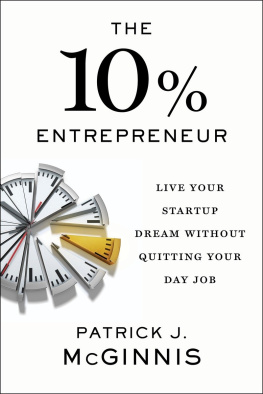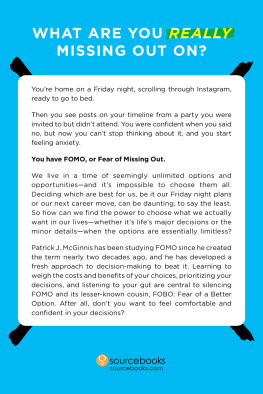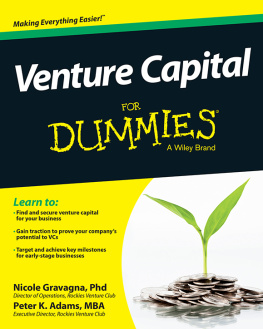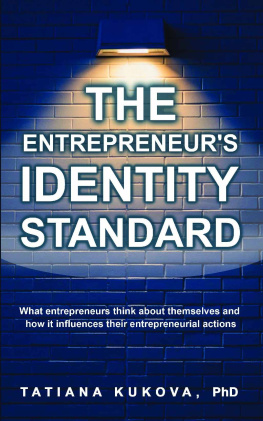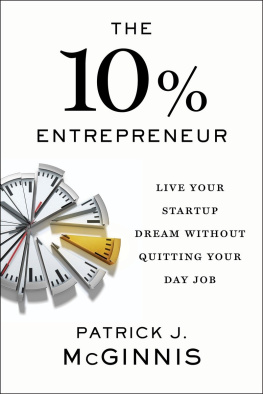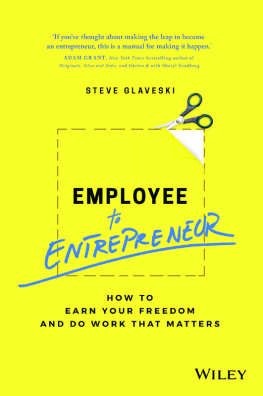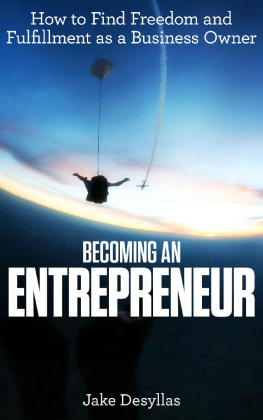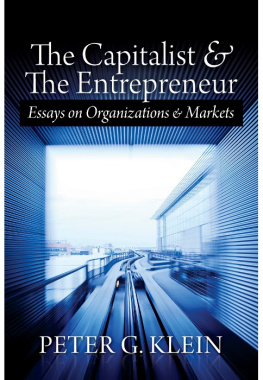Copyright 2016 by Patrick J. McGinnis
Penguin supports copyright. Copyright fuels creativity, encourages diverse voices, promotes free speech, and creates a vibrant culture. Thank you for buying an authorized edition of this book and for complying with copyright laws by not reproducing, scanning, or distributing any part of it in any form without permission. You are supporting writers and allowing Penguin to continue to publish books for every reader.
Introduction
A re you ready to become a 10% Entrepreneur?
If youve been following the rapid changes in technology, opportunity, and mind-set that are reshaping the global economy, then youve probably noticed that a movement is taking form. Everywhere you look, people are embracing entrepreneurship, flexibility, and autonomy as never before, even while holding down full-time corporate jobs. A recent college graduate is starting his own lobster-roll empire, a designer is running a thriving childrens clothing company, and a group of friends from Bible study are building a craft beer company, all on a part-time basis. For them, entrepreneurship is a choice that is additive, rather than absolute, and it offers upside opportunity and downside protection, all while making their lives richer and more interesting. Why shouldnt the same apply to you?
What does it mean to be a 10% Entrepreneur? You will invest at least 10% of your time and, if possible, 10% of your capital into new investments and opportunities. By leveraging your base of experience and your network, you will choose opportunities that play to your strengths and that are complementary to your career and your interests. Most important, you will be the owner of everything you create. You may change your career at multiple points in a lifetime, changing functions, changing roles, and changing companies, but youll always be creating value for the most important employer of all: you.
Let me make something very clear from the outset. This book is not anticorporate or antijob. In fact, its quite the opposite. Over the course of the next ten chapters, you will learn how you can remain completely committed to your job while acquiring new skills that will make you even more effective at the office. After all, there are lots of reasons to appreciate your day job. It provides a place for you to learn, network, take risks, and contribute to a team. You enjoy opportunities for advancement, education, and social interaction. All those things are invaluable, without mentioning the blindingly obvious reason to appreciate your job: it pays you a steady salary plus benefits. None of those considerations should be taken for granted, but as I learned the hard way, you also need to look for more.
My journey toward becoming a 10% Entrepreneur began when I was a vice president at an emerging-markets investment fund. I invested in venture capital and private equity deals all over the world, which meant that I was constantly zigzagging around the globe and working with companies in places like Pakistan, Colombia, the United Arab Emirates, Poland, Turkey, China, and the Philippines. Other than the fact that I lived in a state of permanent jet lag, I loved my job. It was the perfect combination of travel, intellectual stimulation, and financial rewards. It was also the kind of life that allowed for more than a few James Bond moments. Maybe I took the subway to work in New York, but in Istanbul or Karachi or Bogot, I mixed with serious power players who sailed their yachts to dinner or circulated with armed guards in bulletproof SUVs.
Perhaps it was all that jet lag, but the onset of the global financial meltdown in the autumn of 2008 caught me completely off guard. Even as I sat in my office on Park Avenue watching the crisis unfold on CNBC, I didnt quite get how all those changes might affect me. Until they did. Unfortunately, my investment fund just happened to sit within a division of AIG. Yes, that AIG, the one that in the wake of the financial crisis made a reliable target for late-night comedians, picketing protesters, and just about everyone else. It was the company about which Congressman Paul Hodes of New Hampshire declared, I think AIG now stands for arrogance, incompetence and greed. Ouch, that one still stings a little.
Even though the writing was on the wall, I couldnt process what was happening. It didnt make sense. AIG wasnt some bold, sexy hedge fund. It was a boring insurance company with a trillion-dollar balance sheet. A trillion dollars! What could go wrong?
It turns out, a lot. Even a trillion dollars couldnt save AIG once there was blood in the water. It didnt matter that my division of the company had nothing to do with the risky investments that took the business down. In the space of days, the U.S. government announced a plan to effectively nationalize the company. In an instant, everything changed. Rather than working for a trillion-dollar business, I was now essentially a ward of the state. Upon hearing the news, I fired up my laptop and updated my Facebook status: Patrick McGinnis is proud to be working for youthe American taxpayer.
Thats when things got interesting. When I woke up the next day, something occurred to me. Although my firm would probably never be the same, and my future there was unclear, I was still alive and kicking. In fact, I felt strangely liberated. So much so that I resolved to question everything I thought I knew about building a career. I spent the next few months trying to make sense of it all, but I kept coming back to the same question: Where had I gone wrong? Over time, I realized that the answer was staring me in the face: I had naively expected the safety and security of one company to provide everything I needed. Unfortunately for me, that stability was an illusion.
I consider myself lucky. Absent the financial crisis, I would have plugged along, head down, eyes forward, on the same set path. I thought my career was bulletproof since I had done everything by the book and had an MBA from Harvard. I was mistaken. Instead I was now the guy whod built his entire career with the express purpose of avoiding failure but, in fact, had just failed rather spectacularly. It took AIGs stock crashing, both literally and figuratively, to shake me from my complacency.
There was still one big problem. I was completely at a loss regarding my next move. Having advanced through the first decade of my career in a series of step functions, I had never bothered to formulate a Plan B. But there was some good news, too. I was now free to find a different and far more interesting path. All I knew for certain was that I would never again bet the entirety of my career on the fate of one company. Apart from that, the horizon was wide open and I had very little to lose. Id played it safe in the past and look how that turned out, so maybe it was time to embrace a little risk and even consider entrepreneurship.
Yet after some soul-searching, I concluded that I couldnt really see myself becoming a full-fledged entrepreneur, at least not in the foreseeable future. I didnt have any great ideas and I didnt want to give up the stability of having a day job. I also didnt really

